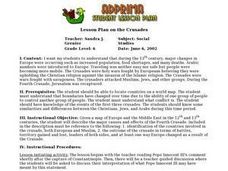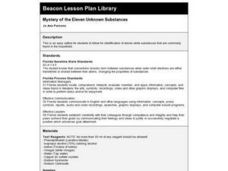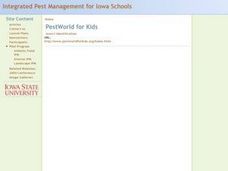Curated OER
The Me Book
Young scholars relate to the pictures as symbols so that they come to point to named pictures, explain what pictured objects are for, match pictures to real objects, categorize objects, and recognize words.
Curated OER
Let it Grow!
Pupils explain the relationship of plants and animals in the environment. They name the basic requirements for plant growth and define the terms photosynthesis, stomata, chlorophyll and xylem.
Curated OER
INSECTS
Seventh graders select, collect, and classify various insects by constructing an apparatus from materials that aid in the capture and containment of the insect.
Curated OER
Create a Soil Aggregate
Students simulate the conditions which occur in a soil aggregate. They explain how IPM affects the environment. They identify the cast of characteristics to develop their aggregate.
Curated OER
Watch the Birdie
Young scholars complete a six-week unit on North American birds. They conduct research, develop fact sheets, create labeled bird drawings, write a dictionary of bird vocabulary words, create a Concentration game, and observe birds in...
Curated OER
The Conceptual Theory of Chromatography
High schoolers conduct a lab to determine the best way to separate a variety of mixtures choosing between paper, thin layer and column chromatography. They use chromatography techniques to identify unknown substances and submit a lab...
Curated OER
Penguins, Penguins, Penguins
Students create "juice bottle penguins" using paper mache, water-based paints, water, and recycled juice bottles. This lesson is intended for early-elementary students and is great as a post-activity for a lesson or unit on Penguins or...
Curated OER
The Crow
In this crows worksheet, students read 4 texts that give information about the habitat, reproduction, feeding and coloration of crows. There are no questions.
Curated OER
Be Nice to Spiders Lesson Plan
Students share their own pages with the rest of the class while they learn about spiders. In this Be Nice to Spiders lesson plan, students learn how spiders are living creatures just like people.
Curated OER
Plant Life for Kids
In these plant life worksheets, students complete a worksheet about parts of a plant, plant life, plant life cycle sequence, and then complete a plant life mini book.
Curated OER
Dr. Seuss Lesson Plan
Students read classic children's books. In this Dr. Seuss instructional activity, students read the Seuss classics The Cat in the Hat, Green Eggs & Ham and Horton Hears a Who. Students create models based on story characters and...
Curated OER
Make Sense of Nature
Learners participate in this program that heightens their awareness and curiosity of nature as well as their sense of adventure and exploring new surroundings. They identify and choose an object from nature after exploring it with other...
Curated OER
Birds of Wisconsin
First graders explore the job done by ornithologists. They role play identifying the characteristics that make a bird a bird. They discuss what makes each bird species unique. Students are introduced to Wisconsin's most common and rare...
Curated OER
Creative Insects
Third graders examine insects that are common around the school. They write a creative story about being an insect for a day and include scientific data that they learned.
Curated OER
The Story that Tracks Tell
Eighth graders observe and investigate animal tracks. They draw prints for local animals and switch with another student to guess the animal, identify animal tracks in a nearby wood lot, create plaster casts of the tracks, and write a...
Curated OER
Lab Equipment - Level II
Students observe a demonstration on use of the microwave with the recipe stickby buns.
Curated OER
Termite Biology
Learners explore the physical characteristics, distribution and habitat of termites. The lesson focuses on the termite as a social creature contrary to most other insects.
Curated OER
Water Quality Survey: Monitoring the Sustainability of Pigeon Creek
Students research the History of Pigeon Creek (or any watershed in your area). In this environmental science lesson, students conduct field tests such as pH and nitrates. They collect data and compare what they collected with other groups.
Curated OER
Conservation Station
Second graders, in groups, measure the volume of four containers that vary in shape and size.
Curated OER
Mystery of the Eleven Unknown Substances
Fourth graders identify eleven white substances that are commonly found in the household. They, in pairs, perform experiments on a variety of substances, and must identify them based on the reactions they observe.
Curated OER
Chinese Ritual: The Death Ceremony
Students discuss the importance of the Death Ceremony in Chinese culture using Du Fu's poem "Fireflies" as a basis of information and create original poetry in the style of Poet Du Fu.
Curated OER
Environment: Mealworm Observations
Students observe plant and animal growth and participate in class discussions about the subjects. They also record their observations in a log. Using observation and the scientific method, they describe the characteristics of mealworms.
Curated OER
Salinity and Brackish Water Systems
Students are able to tell the difference between brackish and salt water. They also are able to distinguish water qualities specific to each type of water. Students answer various questions about all types of water.

























